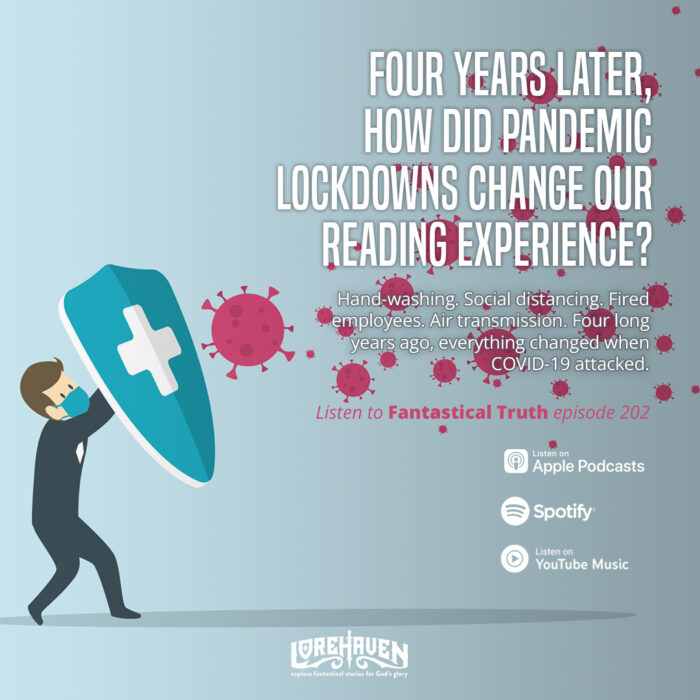202. Four Years Later, How Did Pandemic Lockdowns Change Our Reading Experience?
Podcast: Play in new window | Download (Duration: 1:04:07 — 60.0MB) | Embed
Hand-washing. Social distancing. Fired employees. Air transmission. Four long years ago, the 195 nations lived together in disharmony. Then, everything changed when COVID lockdowns attacked. How did lockdowns change culture? How did our reality’s upheaval affect our enjoyment of fictional worlds?
Episode sponsors
- Enclave Publishing: Guardian by Cathy McCrumb
- Changelings: Insurgence by Liam Corley
- Realm Makers: 2024 writers conference
Mission update
- Our new Book Quest has begun through North! Or Be Eaten.
- Subscribe free to get updates and join the Lorehaven Guild.
Concession stand
- Nope, this won’t be political. By now, I think all that stuff is wrapped up.
- Although we’re still happy about our “COVID vaccine as parable” episode.
- Lockdowns actively shaped this podcast and the direction of Lorehaven.
- So, despite all the nonsense and suffering, God meant this for good.
- We’ll reflect that sense of positivity as we explore this more casually.
1. Lockdowns helped drive us closer to Jesus Christ.
- Some “end is near” fervor can be very healthy for cultures and people.
- We realize we really are mortal and must make good use of our time.
- All this led us to see more value in church, Scripture, and obedience.
- We also found God-given value in humor, alone time, and nature.
2. Lockdowns challenged how and why we read.
- So much screen time reinforced the dopamine/doomscroll problem.
- Many cultural debates distracted us from the purpose of good stories.
- Other debates helped encourage us to participate more in our world.
- That could drive us back to good stories, or unfortunately away from them.
- Career and other life challenges drew our attention to real-world needs.
Quotes and notes
- Coronavirus and Christ, book by John Piper
- “The State of The Culture 2024,” Ted Gioia, Feb. 18, 2024
- It’s Official: We Can Pretty Much Treat Covid Like the Flu Now. Here’s a Guide., Sumathi Reddy, The Wall Street Journal, March 1, 2024
In nonrealistic epics, such as Lord of the Rings, Star Wars, The Princess Bride, and Game of Thrones, tyrants never survive, but heroes do. In realistic epics, such as Spartacus, Nineteen Eighty-Four, Braveheart, and Lord of the Flies, tyrants always survive; heroes never do.
—Robert McKee (in his book Character)
3. Lockdowns made us stronger through challenge.
- For Stephen’s part, his family made big life decisions throughout 2020.
- Stephen got more serious about scheduling, goals, reading, and writing.
- We both installed bookshelves in rooms to show we prioritize reading.
- Our public library has free audiobooks on dedicated “Playaway” devices
- We’ve invested more in books of all sorts, especially fiction audiobooks.
Zack’s strategies for better reading habits
- Read whole chapters at a time.
- Keep internet-connected devices out of reach.
- Use the @freedom app to block distractions for a set time.
- Share monthly reading goals with friends.
- If you feel stuck, try reading shorter books, like novellas.
- Finish half-read books for that faster sense of accomplishment.
- Walk or even fall asleep to the audiobook of an already-favorite title.
- Get a Libro.fm subscription to retrieve entire fiction series on audiobook.
- Follow C.S. Lewis’s advice about reading one old books after you read a new book.
Com station
Top question for listeners
- How did lockdowns shape your own reading experience?
Next on Fantastical Truth
“Since therefore the children share in flesh and blood, he himself likewise partook of the same things, that through death he might destroy the one who has the power of death, that is, the devil…” Next month we begin a new series, He Saves Us, about our Hero’s victory over Satan, sin, and suffering.






























Share your thoughts about this podcast episode